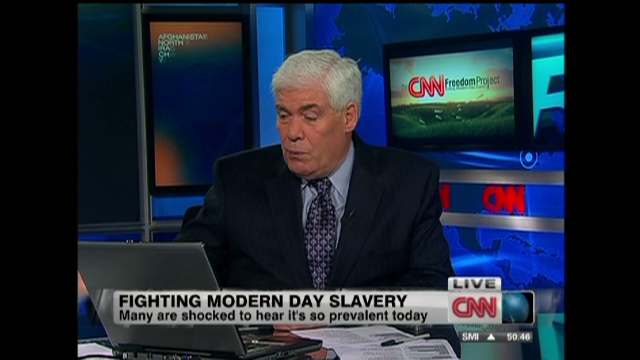NYT columnist Nick Kristof on slavery: “We see these girls as criminals rather than as victims.”
In an interview with CNN International’s Jim Clancy today, author and New York Times columnist Nicholas Kristof discusses human trafficking and why this global problem is getting worse.
As one of the strongest voices calling attention to modern-day slavery, Kristof says “We see these girls as criminals – even if they’re 13, 14 years old – rather than as victims of trafficking.”
Full transcript after the jump.
FULL TRANSCRIPT:
JIM CLANCY, ANCHOR OF CNNI’S ‘THE BRIEF’: I want to take a few minutes now, let’s talk — put our focus on the CNN Freedom Project, what’s going right, what’s going on wrong in the fight to end human slavery.
One of the strongest voices calling attention to this modern tragedy has been that of “New York Times” columnist Nicholas Kristof. I was talking with him a little bit earlier about the way most of us really thought slavery was really something confined to the history books until we discovered it’s more prevalent today than ever.
(BEGIN VIDEOTAPE)
NICOLAS KRISTOF, AUTHOR & “NEW YORK TIMES” COLUMNIST: Obviously, it has been around all along, but it has indeed actually gotten worse, and I think there are few reasons for that.
One is that we’ve seen a general shift to market economies, for example in eastern Europe, and as everything — I mean, that was great, but as everything else became a commodity, so did young women in countries like Romania, Belarus.
Then, we’ve also seen in a lot of countries a growing internationalization, growing urbanization. And so you get these, you know, village girls who go to the cities to work as maids, to work in factories, and they tend to get tricked by recruiters who offer them jobs as maids and then lock them up in brothels.
CLANCY: They end up in the brothels and when there’s police enforcement, they’re often the target, they are the ones who are arrested. And that’s not solving the problem at all, it actually perpetuates it.
KRISTOF: That’s right. I mean, there are a couple of problems. One is that the whole issue of trafficking is hugely fed by corrupt police.
In Cambodia, I once marched into the — the very worst brothel in a town called Poipet (ph) where they were keeping underage girls locked up in cages, and I marched in with a camera, and — you know, huge chaos.
A moment later, a car rushed up and a policeman walked up to me and handed me his card and said, I’m the owner of this brothel, may I help you, and he ran the criminal division of the local police. And in a number of countries, that is the pattern, that there is real collusion between traffickers and the police.
But the other problem, as you say, is that, you know, the pattern is that we see those girls as criminals, even if they’re 13, 14 years old, rather than as victims of trafficking. And I think that is just a complete misapprehension of what goes on. I mean, the notion that a pimp is a business partner of a 13-year-old girl on the streets is a complete misunderstanding of that relationship.
CLANCY: There are lessons, aren’t there, being learned right now about how you handle these cases, about what is the way forward?
KRISTOF: Look, nothing has worked very well. No policy is — is perfect. But there seem to be two strategies that really do make a difference.
One is that, you know, the traffickers are businesspeople and they respond to incentives. You throw some of them in prison, you erode their profit margins and they steal cars instead, they pirate videos instead.
And in a number of countries I’ve seen, including Cambodia for that matter, you’ve actually seen a drop in the worst kinds of trafficking because the police have begun to throw a few people in prison.
CLANCY: There’s also a problem with forced/coerced labor, people held — you know, they’re given a small loan, maybe less than a hundred dollars, an entire family could spend 10 years working it off, they never get it paid off. These people are serial victims. Is there a way out for them?
KRISTOF: Well, again, and this is a huge problem in India and Pakistan, for example. And the problem is that society just looks the other way and averts it’s eyes. And the moment you do go in and have police rescue those laborers and allow those kids to go to school, for example, it completely transforms the picture.
CLANCY: So many young people around the world are involved in combating this because they say they see themselves as the victims. Young people that have hopes and dreams and cross borders hoping to for that job, they are misled. Do you see something optimistic on the horizon here? Where do we stand today that gives you hope?
KRISTOF: Well, look, you know, in the 19th century, people were able to abolish a form of slavery that was deeply embedded in the global economy, and these days I think it is, you know, actually rather more easy to make a difference.
And you look at Thailand, for example. Thailand used to have a vast problem. There is still forced prostitution in Thailand, but it’s much more likely, especially involving Thais, to be voluntary. You’ve seen some improvement in Cambodia in terms of the, you know, there are a lot fewer 13-year-old girls locked up in back rooms there.
And so, this is an area where it really does seem to me we can see improvement if we just keep that spotlight on it. And I’m just so impressed by, you know, young people all over the world who have taken on this issue and figured that it’s time to have an emancipation for the 21st century as well.
END
